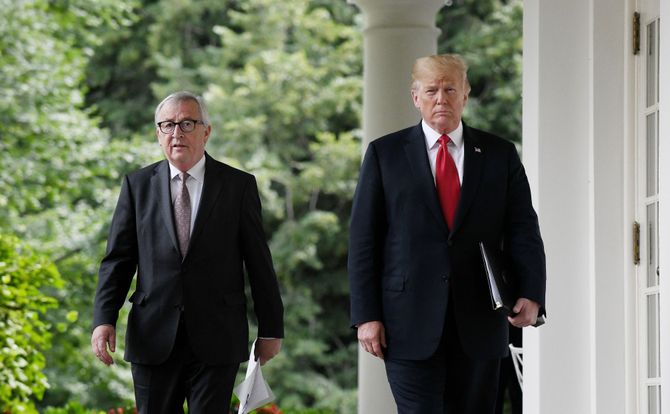Thank you, Mr. Trump
U.S. President Donald Trump is right that the EU and China use unfair trade practices. Now, his threats to impose tariffs on European goods – hypocritically branded “protectionist” by many countries with higher trade barriers – brought EU officials to the negotiations.

In a nutshell
- Donald Trump’s “protectionist” threats may actually bring freer trade between the U.S. and the EU
When United States President Donald Trump announced higher tariffs on the import of some European goods, Brussels first reacted self-assuredly and threatened retaliation. This did not impress Washington. When European Commission President Jean-Claude Juncker and Trade Commissioner Cecilia Malmstrom visited the White House earlier this week, it showed the European Union realized it had more to lose in a tit-for-tat trade row than the United States.
As far back as his 2016 campaign for president, Mr. Trump announced that he would address the issue of trade imbalances, especially with China. And it is true that China is extremely protectionist when it comes to its own market – not only through the use of tariffs, but also bureaucratic hurdles, quotas, intellectual property appropriation and other measures. Furthermore, China subsidizes its exports and illicitly acquires technical know-how. It is correct to claim that China is strongly engaged in unfair trade practices.
A U.S. reaction to these practices is overdue. But unfortunately, the EU itself is very protectionist, mostly using regulatory barriers under the pretext of consumer protection. The Transatlantic Trade and Investment Partnership (TTIP) was never concluded due to European fears of American competition. A certain consolation for this failure is that the treaty’s complexity may have made it inefficient.
President Trump has now begun to make good on his promise. Hypocritically, the perception has been created that the U.S. is protectionist, and countries or blocs such as China, India and the EU are pillars of free trade. In fact, they are all protectionist. However, the U.S. is probably less discriminatory than China, India or the EU. The U.S. is also less dependent on international trade than any other country.
Understandable frustration
The American frustration is understandable. Using its unfair practices, China runs a huge trade surplus with the U.S., which is also shown by the huge amounts of U.S. dollars China holds. Retaliation for China’s unfair practices is necessary and justified, although the U.S. manufacturing sector also has to improve quality and productivity. It must be irritating for Washington to observe how Beijing uses the dollars it receives from its trade surpluses to garner influence in many countries through investments and loans. This is against the U.S.’s long-term strategic interest.
The case with Europe is slightly different, as European countries do not subsidize their exports to the U.S. However, Europe also runs a surplus. Here the main bone of contention is European import barriers. In general, European import tariffs are higher than the U.S.’s. The EU’s regulatory barriers are also substantial, and the European agricultural market benefits from big subsidies.
Another frustration – maybe not economically founded but understandable – is the fact that Europe relies heavily on the U.S. for defense, but gets its gas from elsewhere. For example, instead of importing liquefied natural gas (LNG) from the U.S., Germany assures its future gas supplies from Russia, while mainly depending on the U.S. for its security. Germany has also proven lackluster in improving its own defense capabilities.
It appears that the EU and the U.S. are now agreeing to resolve the conflict. This could be a huge opportunity for the EU to reduce its protectionist stance, to the long-term gain of its member countries and global trade in general. GIS has frequently highlighted the merits of true free trade and the benefits for Europe, if the EU would end its discriminatory measures – of both the tariff and nontariff varieties. Let’s hope that both sides will take advantage of this opportunity to increase global prosperity. Maybe in the end Brussels will have to say, “Thank you, Mr. Trump”
